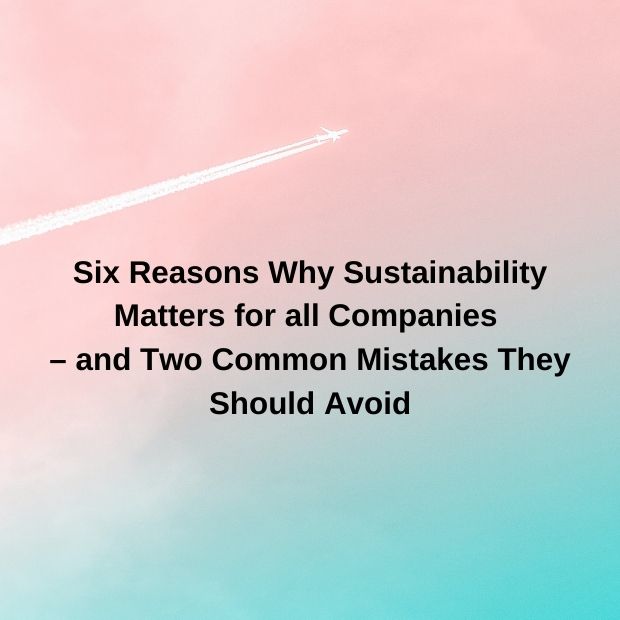
Six Reasons Why Sustainability Matters for all Companies – and Two Common Mistakes They Should Avoid
By Michael Diegelmann and Justus Fischer – cometis AG
Sustainability Matters: People are aware of global challenges like climate change, pollution and social inequality, and they discuss them and ask for solutions. It is clear that companies have a major impact on social and ecological issues, so the pressure on them to operate sustainably is increasing accordingly. Not only because of overall societal sentiment, but also because many investors nowadays do not want to invest in a company that has a poor ESG (Environment, Social, Governance) performance (Note: ESG is investor speak for sustainability). This means those companies that truly care about ESG issues are seen as responsible – and consequently have a competitive advantage.
Here are six important reasons why ESG should be a fundamental part of every business strategy.
1. Comply and explain or get sued
Governments around the world have ESG topics at the top of their agendas, resulting in ever stricter regulations. Under the Biden administration the U.S. will rejoin the Paris Climate Agreement and in New Zealand financial companies must report on climate risks already. In 2022, the EU Sustainable Taxonomy will come into effect, meaning that every company in the EU will be asked to disclose the percentage of sustainable sales according to the EU’s sustainability definition. Products can only be classified as sustainable if they make a positive contribution to one of six EU sustainability goals like climate change mitigation or supporting a circular economy, and do not significantly harm one of the others.
2. Poor ESG performance will drain investments
Every investor is going to ask how sustainable your business is. Depending on your answer, investors will love to invest in your company – or not. The better your ESG performance is, the bigger your chance to attract and retain investments will be. The total value of assets under management allocated to ESG-criteria has increased from 22.9 trillion U.S. dollars in 2016 to more than 40 trillion U.S. dollars in 2020. Seven of the largest ESG mutual funds in the U.S. have outperformed their market benchmarks in the Standard & Poor’s 500 Index over the past five years. Even the corona crisis highlighted the power of ESG: sustainable investments were able to convince with above-average performance. This shows that more and more asset owners expect the implementation of ESG to be of great importance for the long-term value development of their assets.
3. You will get rated – if you want it or not
Investors want to compare the ESG performance of companies to make reasonable judgements on whether to invest in a company or not. Rating agencies promise comparability, and so receive fees from investors for giving them ESG data, often along with a particular rating, on thousands of companies. Do you know whether your company gets rated already? If not, you can be sure that your company will get rated, too – whether you want it or not. So better start giving the ESG algorithms what they crave for: well-structured, easy-to-access data. Which leads us to the next point…
4. Algorithms everywhere: watch your mouth!
Algorithms do not only search for relevant data and ESG information in your reports. They are more than just stupid crawlers and are even able to figure out whether your written and spoken phrases should be interpreted in a positive or negative manner. Many recommendations by analysts are based on such algorithmic interpretations. So be careful of what you say and even how you say things. Saying, you ‘believe in ESG’ is understood less positively than saying ‘ESG is a big win’. Actually, this sounds plausible, doesn’t it?
5. ESG is not limited to listed companies
ESG concerns literally every company, not just listed ones: Suppliers must increasingly provide information that ensures human rights are met and disclose the carbon emissions of a particular product they sell. Furthermore, many companies today have codes of conduct for suppliers – if you do not follow them, you will lose your orders. Already, there are companies that order only from sustainable suppliers – like McDonald’s for its coffee products. So, ignoring ESG can soon mean that you will lose business.
6. Your future employees care about sustainability
Awareness for ESG issues and their importance are growing. It’s not just the NGOs that are fighting for climate protection and social equality. Many people care about these topics, too – for example when making job choices. Employees complaining about pollution or the non-transparent supply chain in their company might start working for other, more ESG-responsible employers. Take this survey, for example, in which 66% of the interviewed employees say sustainability is extremely relevant for them.
Also, your workers of the future, specifically Generation Z, are insisting on sustainability more than any generation before. This is particularly evident in the Fridays for Future demonstrations. Most of those young people will look for information about your sustainability performance before they apply for a job at your company.

But even if companies are aware of all those things, there are two common mistakes many companies still make when taking up their ESG journey:
1. Talking but no walking
Motherhood statements, feelgood stories and positive spin will only work in the short term. But the damage to your credibility will stick for much longer. If you don’t walk the talk, the public will see through your greenwashing very quickly. You need clear goals, commitments, and actions to win people over in the long term. This also means being honest about when you fall short of your own goals. Your company can’t just sing ballads of its great achievements. It needs to also own up to its failures.
2. Being lost in translation
You can be making leaps and bounds of progress, but if your stakeholders don’t hear about your work, you’ll miss out on many of the benefits. This means reporting your sustainability work and progress effectively. And, more importantly, using the language that your audience is attuned to. Framing your work using internationally recognized frameworks such as the Global Reporting Initiative, Sustainable Development Goals or Task Force on Climate-related Financial Disclosures, will help you tell your story in a meaningful way.
Overwhelmed by all those ESG challenges? Don’t worry: as the big ESG trend has only just begun, it’s not too late to get into the game and avoid being left behind. But what should you specifically do? Well, there’s always the option to get professional support to get the sustainability topic kick-started at your company. The PRGN has multiple experts that are happy to help you develop a sustainability strategy and tackle above challenges. Let’s get to work since sustainability matters!
This article was originally published on the Public Relations Global Network, here.









